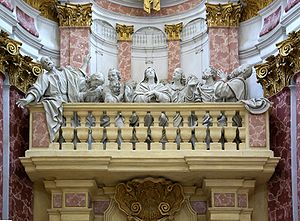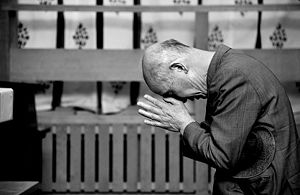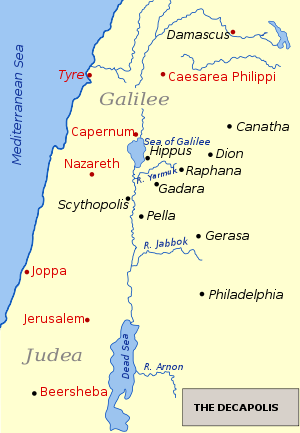 Image via Wikipedia
Image via Wikipedia
OK I think I'm getting it, essentially you believe that God must treat us all the same and that His intervention, if any, must be equal in every way. To suggest that God might not be 'impartial' would describe a God who is 'unfair'. If that's it, then I can agree with you up to a point'.
However we are made in the image of God and have been given the attribute of consciousness and self determination (free will). Our relationship with God, for me, is real and I am involved in how my relationship with God pans out. If I sin, then I am further from God, as it were. God loves me just the same, like the father of the prodigal son, but my sin doesn’t help. In the same way that my love for God might lead me to ‘good works’ and that will draw me closer to him. How we behave has a real effect on our relationship with God and on the quality of that relationship.
So we are all offered the same opportunity to be close to Him but we also have a choice in how we respond to His love. We are indeed children of God but we are also able to choose to love or to reject Him, just like your children. Without this possibility then we would be no higher than angels and the sacrifice of Christ would not have been necessary.
In the matter of prayer, or more specifically response to our prayer then I am unable to offer you either signs or arguments, as my original article was attempting to say, but I can offer some other thoughts in the light of your ‘hatred’ of the God I believe in.
The Bible is a notoriously difficult book insofar as we have to respond to ambiguity and contradiction that lies therein, however it is considered to be Holy and authoritative. You and I have to read it and draw our own conclusions according to how we believe the Holy Spirit guides us. If we also subscribe to membership of a particular ‘church’ then we may also owe some obedience to that Churches’ view of the Bible. (This is perhaps a little contentious).
In my own understanding of the Bible and in line with general teaching regarding prayer by various Christian communities I believe that God does intervene in response to prayer. I have no particular insight into how this works and why, as I have said earlier.
I don’t believe that this necessarily defines His action, in response to prayer as being unjust in relation to others. Firstly situations are often so complex that reducing the argument to a comparison of ‘like with like’ is not, in my opinion, possible. I guess I leave that to Him.
Secondly I don’t think that He started the ‘machine we call life’ and then left the building. In other words I believe that He hears prayer and answers prayer in very real ways; ‘Give us this day our daily bread’.
Thirdly I believe that we are called to help one another. To reject prayer as a way of assisting others through intercessions in the ways I have suggested is, in my opinion, to limit prayer and at worse turn it into a self indulgent therapy session.
Finally I believe that God intervenes directly in this world and has done so throughout generations, but most spectacularly in His incarnation and in the miracles that Jesus did, and of course the resurrection of Christ. Essentially God made the world and takes an active and continual part in it, throughout time. Why one blind man might be healed rather than another? Well I do believe Jesus was asked a similar question.
However I do agree with you that if this were to be elitist and preferential then it would be wrong, however this is available to us all. Paul gave thanks for those who ‘knew Jesus in their hearts’ but had never heard of Him, and I believe the Holy Spirit will go wherever it will. I believe that God is there for every child, and if we choose to turn to Him then he will respond unreservedly with real and practical love. But if we do not turn to Him then we are missing out. Our choice.
I hope that this helps but I accept fully that this may not advance your understanding one jot, and for that matter it may simply reveal that I am foolish.
MrC
 Image via Wikipedia
Image via Wikipedia 













